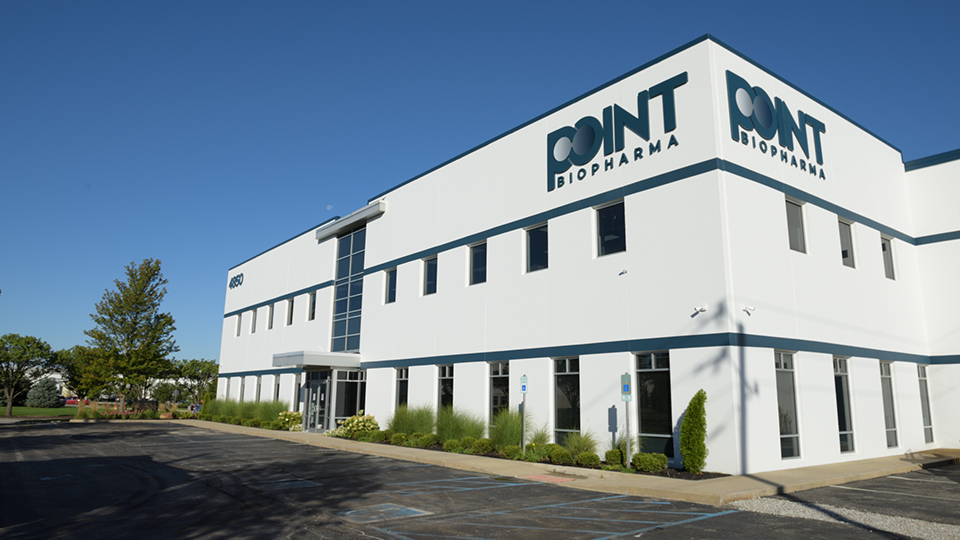Point Biopharma finds big licensing partner, but stock falls
Subscriber Benefit
As a subscriber you can listen to articles at work, in the car, or while you work out. Subscribe Now
It was supposed to be a “good-news” day for Indianapolis-based biotech Point Biopharma Global Inc. (Nasdaq: PNT).
Instead, the company saw its stock get battered Monday, losing as much as 38% of its value, after it released a pair of announcements.
Point Biopharma, which is developing targeted drugs for the treatment of cancer, said it had entered a licensing deal with Lantheus Holdings, a large diagnostics and therapeutics company based in Massachusetts, that would give it millions of dollars to help fund expensive clinical trials.
But at the same time, Point Biopharma also said it lost $24 million in three months ending Sept. 30, compared to a net loss of $17.1 million in the same period a year ago.
The wider loss shows that Point Biopharma’s expenses are climbing as it advances its lead compounds through clinical trials. The three-year-old company is developing experimental, radioactive cancer drugs. The company has said it expects to incur “significant losses for the foreseeable future.”
Shares of Point Biopharma closed Monday down $3.13, or about 37%, to $5.72. The stock has plummeted more than 45% since its 52-week high of $10.98 in September.
It’s another setback for the company, which in September saw its stock fall 16% in one day after its underwriter priced new shares of company stock at a discount. The company offered an additional 13.9 million additional shares at $9—lower than its closing price of $10.17 that day, to raise funds for operations and research.
Last year, the company spent $25 million to renovate a 77,000-square-foot building off Georgetown Road for use as a manufacturing plant. About 50 employees work at the site, and an additional 70 work remotely across the United States and Canada.
In January, the plant began producing small batches of radioligand drugs for the company’s late-stage trial for an advanced form of prostate cancer known as metastatic castration-resistant prostate cancer.
Under the licensing deal announced Monday, Lantheus will pay $260 million in upfront payments for the exclusive worldwide rights to two of Point Biopharma’s drug candidates.
The deal could eventually give Point Biopharma as much as an additional $1.8 billion if the experimental drugs meet regulatory and sales milestones.
The deal will give more secure financial footing to three-year-old Point Biopharma, which has yet to launch a product and last year posted a net loss of $45.9 million. It also gives Point Biopharma a big partner to help it commercialize the drugs, if they make it through clinical trials.
Cowen Equity Research analyst Boris Peaker noted that Point Biopharma had $291.5 million in cash at the end of the quarter, which he said would fund operations into the fourth quarter of 2024. “Lantheus deal extends cash runway for many years,” he wrote.
Company officials said the partnership had a raft of benefits.
“This collaboration also immediately unlocks value for Point, reduces the need for dilutive fundraising and enables us to focus on our pipeline next-generation radioligands, which could be transformative for the field of precision oncology,” Joe McCann, CEO of Point Biopharma, said in written remarks.
Lantheus, based in North Billerica, Massachusetts, is a larger company, with revenue last year of $425 million. The company specializes in precision diagnostics and radiopharmaceutical oncology.
Point Biopharma has spent money to beef up its ranks, recently hiring an executive vice president for commercial strategy—a signal that it believes it is getting close to the point it will need to start marketing and selling the product commercially.
But it’s unclear how expensive the drug will be or what the market opportunity is for Point Biopharma.
The treatment is not yet approved by the U.S. Food and Drug Administration, and the company has not yet disclosed a price. Treatment requires four doses, each separated by eight weeks.
